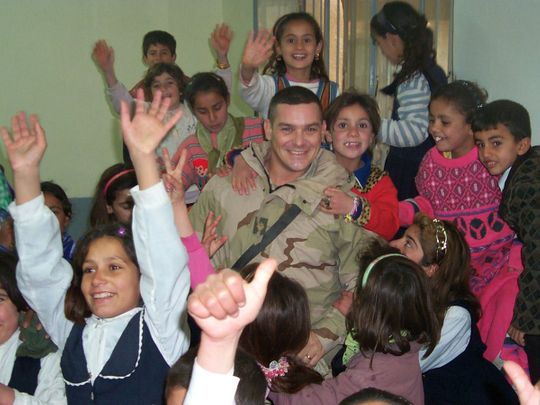
Saddam Hussein was in hiding, a brutal insurgency was forming and Iraq's fragile infrastructure was failing. So the Kurdish village chiefs made a simple plea to the American soldiers in the area: They needed water and they needed the bullets to stop flying.
Bashar Karim was an integral part of the first request. Army Maj. Fred Wellman would help address the second.
Karim, a Mosul University law graduate, was deputized as an interpreter for U.S. troops soon after the invasion in 2003. His village in northern Iraq welcomed the U.S. invasion that toppled Hussein after his repeated attacks against the ethnic minority.
"It was a bad situation," Karim said about Hussein's reign. "We were persecuted."
Karim went to work as a liaison between U.S. troops and the local workers marshaled to bring water projects to the area, including a nearby Iraqi air base that had been seized.
Wellman was there too, and the men became fast friends. He'd bring toys for the kids, Karim said, and provided resources for the water project. Wellman's unit built a clinic for a village doctor, named Mohammed, and filled it with supplies. He put an end to the bullets that were ricocheting into the town from a nearby rifle range.
When President Donald Trump removed U.S. troops from northern Syria, memories of serving alongside Kurdish forces against the Islamic State came flooding back for both men.
The shift of U.S. troops to Iraq has angered Kurds in the region, exposing some to attacks and potential ethnic cleaning by Turkey. It also ignited accusations of abandonment after the U.S. used Kurdish fighters as ground troops during the conflict.
Some Kurds threw tomatoes and stones at retreating troops.
"We feel trapped. We were abandoned and betrayed by the president of the United States," Karim, 40, told The Washington Post by phone. "After we finished the mission we didn't expect to get treated this way."
"He is one of us,"
That sentiment was echoed by Wellman, who, like other troops and veterans, has expressed shame and disbelief over how years of their partnership - with Kurds absorbing thousands of casualties - had vaporized.
Wellman posted photos of himself with Iraqi Kurdish children with families rooted throughout Syria and Iran.
"Through all 3 of my Iraq tours I supported them, trained them and served as an adviser," he wrote on Twitter last week. "These kids would be in their 20's. I wonder if they're already dead."
The message went viral, with more than 18,000 retweets.
Then something remarkable happened. Karim had lost touch with Wellman, but he was scrolling through Twitter soon after and saw Wellman's message. Karim even recognized the kids in the photo.
"I shouted and said I know this person," Karim wrote in an email to Wellman on Tuesday, two days after Wellman's tweet. He was delighted and relieved to see his friend again, albeit online.
What struck Karim about Wellman was how he dove into Kurdish culture. Food was brought out during meetings with elders and chiefs, with soups, dates, and occasionally an entire lamb. The custom is to eat with your hands, Karim said, and asking for utensils was taboo. But Wellman jumped right in.
"He is one of us," Karim said.
After Karim found him, Wellman started to hear from others he befriended during his time there. Villagers emailed him to identify the children as family members and friends. Some of them had their own children. One friend's son lives in Seattle.
They later spoke on the phone, and Wellman, now 54, heard what Karim had been up to since they last saw each other 16 years ago.
There were things they both knew. Mohammed, the doctor, was murdered by insurgents in 2012, killed in his own clinic that Wellman helped build. And another interpreter they both knew, a Coptic Christian named Bassam, was beheaded in 2004.
A video of his killing was sent to other interpreters as a warning. Wellman saw it. Karim couldn't bear to watch.
But some brighter moments Wellman hadn't known, like how Karim fled Iraq in October 2011 and settled in the United States.
He became a naturalized citizen and made a home among other Iraqis in Lincoln, Nebraska, with his wife and four children. Two of them were born in the U.S. And now, Karim is a representative for fellow immigrants at the Lutheran Family Services of Nebraska, a community resource organization.
"My heart soared knowing he got out when he did," Wellman said. He told Karim about his veteran and military-centric PR firm that he started after retiring from the Army in 2010, and his new life in Virginia.
But the circumstances that animated a digital reunion has made Wellman seethe for weeks.
"To be so flippant about lives we're protecting, it's appalling to me," he said.
Karim protested with fellow Kurds on Friday on the steps of the Nebraska state capitol alongside about 80 other people.
"We asked the U.S. representatives to do anything in their power to intervene and maybe revise this decision or talk to the president or do something about this to stop this decision," Karim told local media from the protest.
Most former interpreters try to lay low after integrating into American life, Wellman said, so it was astonishing for him to see Karim's fierce advocacy.
"It shows the bravery of the Kurdish people," Wellman said. "It's inspiring as hell to me."








